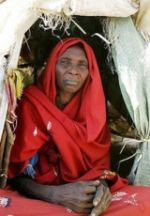Darfur camp dwellers resigned to refugee life
March 24, 2007 (El-FASHER) — The United Nations’ new humanitarian chief made his first trip to Sudan’s Darfur region on Saturday but the visit raised little hope among people displaced by years of violence.
 Inhabitants of the Abu Shouk Camp, who lined up for hours in the blistering sun to fill plastic buckets from a well, appeared resigned to life in the sprawling desert base of 54,000 refugees.
Inhabitants of the Abu Shouk Camp, who lined up for hours in the blistering sun to fill plastic buckets from a well, appeared resigned to life in the sprawling desert base of 54,000 refugees.
Latifa Youssef said she could never go back to the village where she watched militiamen shoot her father. She spends five hours a day making bricks and carrying them on her head back to her hut.
“We can’t leave here because we’re scared of the Janjaweed and we have no work to go back to,” she said.
U.N. Under-Secretary General for Humanitarian Affairs John Holmes is on his first mission to Darfur to seek better cooperation from the Sudanese government.
Khartoum has come under fresh pressure from Western powers to ease the suffering in Darfur, where experts estimate 200,000 people have been killed and 2.5 million driven from their homes after rebels rose up against the government in 2003 charging the central government neglected Darfur.
Washington calls the violence genocide and blames Khartoum for backing militias blamed for many of the worst atrocities.
Khartoum denies genocide and allegations of widespread violations, including killings, rapes and arbitrary arrests carried out by proxy militias, and blames the abuses on rebels.
Khartoum has refused to allow U.N. troops into Darfur, saying this would amount to foreign occupation.
The humanitarian crisis resulting from the conflict is one of the worst in the world and aid workers say deteriorating security has greatly impeded the areas in which they can operate.
In the camp in North Darfur, residents were haunted by the violence they fled.
When asked what he thought of the new U.N. official’s trip to the region, 10-year-old Omar responded with a disconnected, “Arab killers”.
He seemed to have settled into a routine at the camp, playing soccer in the dirt beside a sea of straw huts.
Abdullah Babikamali, 18, too said he remembers a past of killing, rape and pillaging by militias in his village.
“I want to become a doctor so I can cure people here of diseases like tuberculosis,” he said, leaning on a wall with a friend, imagining a future beyond the camp he is not likely to leave soon.
For the women, there is no play or dreaming of a better future. There is only work.
“I came here three and a half years ago. We can barely find water, there’s no money,” said Idris Khamees, as humanitarian workers distributed blankets which many said could not accommodate families with eight or nine children.
(Reuters)
